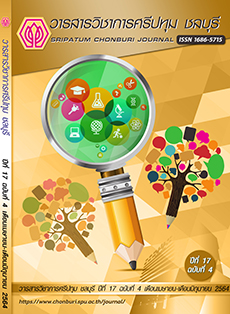BUSINESS TRANFORMATION FOR SMALL AND MEDIUM BUSINESS (SMEs) TO THE NEW BUSINESS MODEL AFTER CORONA VIRUS OUTBREAK (COVID-19)
Keywords:
new normal, business transformation, Corona virus 2019 (COVID-19)Abstract
The objective of this articles is to study the operating adjustment of SMEs during the COVID-19 pandemic for implementing business strategies in changing environment, so entrepreneurs can adjust to the economic recovery. The outbreak of the Corona virus started to spread in December 2019, later it become a global pandemic, it was first discovered in Wuhan (the capital of Hubei province in China). On January 2020, the World Health Organization (WHO) declared an international public health emergency later a global epidemic on March 21, 2020. It became more serious towards the end of the year. It is certain that the outbreak of the Corona virus (Covid-19) affected every sector, including economics, politics, world society, as well as the way of life of people to. There are official reports of the world's first new virus infection or now known as "Covid-19". Even though, this situation is considered a nightmare therefore there is a goodness because it is the beginning of the signs of improvement in this epidemic crisis. Particularly, in China, it reflected by the rate of COVID-19. It slowed down including a death rate compared to other viruses. The author hoped that this global epidemic of the corona virus will subside and end soon. However, it cannot be denied that the corona virus has caused anxiety and fear for people all over the world in recent years.
References
แจน (Jan). (2563). หลัง Covid-19 เทรนด์ผู้บริโภคไทยเปลี่ยนพฤติกรรมถาวร เปิด 4 แนวทางธุรกิจพลิกวิกฤติเป็นโอกาส (ออนไลน์). เข้าถึงได้จาก: https://www.brandbuffet.in.th/2020/04/nielsen-changing-consumer-behavior-in-covid19/ [2563, 9 กรกฎาคม].
ไทยรัฐออนไลน์. (2563). พฤติกรรมผู้บริโภค เมื่อถูกโควิด-19 บังคับดิสรัปต์ (ออนไลน์). เข้าถึงได้จาก: https://www.thairath.co.th/news/business/market-business/1825376 [2563, 9 กรกฎาคม].
บดินทร์ พุทธอินทร์ และเทดดี้ อีริคสัน. (ม.ป.ป.). New normal ในโลกหลัง COVID-19 ที่ไม่มีอะไรเหมือนเดิม (ออนไลน์). เข้าถึงได้จาก: https://www.tmbameastspring.com/insights/new-normal [2563, 9 กรกฎาคม].
สุพัฒน์ โตวิจักษณ์ชัยกุล และกรวรรณ สังขกร. (2552). ผลกระทบจากการขยายตัวของธุรกิจค้าปลีกข้ามชาติที่มีต่อธุรกิจค้าปลีกขนาดเล็กของไทย. เชียงใหม่: วนิดาการพิมพ์.
อลงกต ใหม่น้อย. (ม.ป.ป.). การวางแผนกลยุทธ์ภายใต้สภาพแวดล้อมที่มีการเปลี่ยนแปลงตลอดเวลา (ออนไลน์). เข้าถึงได้จาก: https://sites.google.com/site/mralongkotmainoy/kar-wangphaen-klyuthth-phay-ti-sphaph-waedlxm-thi-mi-kar-peliynpaelng-tlxd-wela [2563, 9 กรกฎาคม].
แอคเซสเทรด (ACCESSTRADE ). (2563). การปรับตัวของธุรกิจ SME ในสถานการณ์ปัจจุบัน: อัพเดทการปรับตัวของธุรกิจ SME หลังยกเลิกล็อกดาวน์ (ออนไลน์). เข้าถึงได้จาก:
https://accesstrade.in.th/การปรับตัวของธุรกิจ-sme-ใน/ [2563, 1 สิงหาคม].
Downloads
Published
Issue
Section
License
บทความทุกบทความเป็นลิขสิทธิ์ของวารสารวิชาการศรีปทุม ชลบุรี



